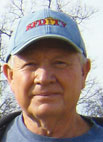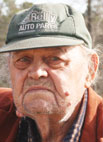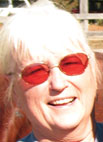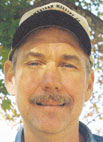Teamwork Pulls It All Together
Most everyone involved in agriculture today realizes that every part of a family's farm program has to mesh in order to work together like a well-oiled machine, and different enterprises must mutually benefit each other.
From Dairy to Salers
When Ricky Hogue and his wife Regina decided to sell their dairy business five years ago and go into raising beef cattle, they chose Salers (pronounced Sa’lair). With a unique background, the breed is considered among the oldest and most genetically pure of all European cattle, a fact that produces positive effects on the predictability of Salers in crossbreeding programs. Ricky’s cattle are mainly a cross between Salers and Angus, and some are Brangus mix. They own 460 acres, and lease another 500 acres for pasture. They run 250 head of momma cows, half calving in the fall and half calving in the spring, and eight bulls. Years ago, his dad, mom and seven brothers and sisters worked the fruit harvest in California, saved their money, then came back to Arkansas and bought the land which is now the home place.
Half a Century of Angoras in Arkansas
Arnold Ahrens and his wife Bernice farmed in Fredericksburg, Texas during the mid 1940’s during an extended drought. Some acquaintances that were from the same area of Texas had moved over to Arkansas, and when they came back to visit, they were talking about how grassy it was here. Liking the sound of grass aplenty, Arnold decided to look around at some land in Arkansas. Not long after, he and Bernice settled down around the Sands Springs area, in Lamar, Ark. In 1949, Arnold hired a truck to bring in about 100 head of Angora goats from Texas, along with some sheep and cattle he had. It was the beginning of a long, rich Arkansas farming story for Arnold and Bernice. Through the years they have acquired close to 1,000 acres between Clover Creek all the way to Big Piney.
The Best Decision Ever Made
Danny Chrisman owns and lives on the farm his father once owned. Although his dad owned the farm, they lived in Springfield, Mo. “I lived near Phelps Grove Park, and eventually moved east of Chestnut Expressway,” he said.
Generational Changes the Industry Brings
"Beef or dairy? Red or black? Original breed color or color driven by customer demand? Put up your own hay or buy it? Use a bull or AI?” These are some of the personal preferences addressed by four generations of the King family on their farms near Ava, Mo.
It Can Be Done
Looking at high land prices, rising operating costs and easier ways to make a living may make young people look another direction than farming when deciding their futures, even when their hearts are connected to the land.
Advice-givers who don’t understand that connection — and maybe even some who do — may support a choice in another profession. “It can’t be done,” they say to those seeking entry to agriculture.
But while others are preaching pessimism, Jack Miller offers encouragement.
Advice-givers who don’t understand that connection — and maybe even some who do — may support a choice in another profession. “It can’t be done,” they say to those seeking entry to agriculture.
But while others are preaching pessimism, Jack Miller offers encouragement.
Horses the Right Way
"If you take a young horse and start it out right, with the right attitude, you’ll have a good horse the rest of your life,” explained Rita Schmidt of Shoal Creek Ranch in Mountain Home, Ark. “That’s what we do here with our horses,” she added.
Keys to Managing Bird Health
The commercial turkey industry has undergone dramatic improvements in growth and feed efficiency since 1920s when U.S. turkey growers produced one turkey for every 29 people. Today, the National Turkey Federation indicates that the average American downs about 16.9 pounds of turkey – a near 108 percent increase since Norman T. Findahl III, (hereafter, Norman) began working as a poultry grower in the late 1970s.
In the Service, At the Farm
"Gelbvieh calves are small, but grow very quickly. Gelbvieh cows are excellent mothers and are good milkers, too,” Brenda Shealy said. Brenda knows her breed, thanks to a second chance at a life on the farm.
Input Costs Almost Disappear
A fourth generation dairy farmer, Mike Meier has been milking “forever.” Four years ago he was thinking of quitting. At that time, they were a confinement dairy. It took three men working all day to keep up. All the equipment used for feeding the cows was wearing out and too expensive to replace.











